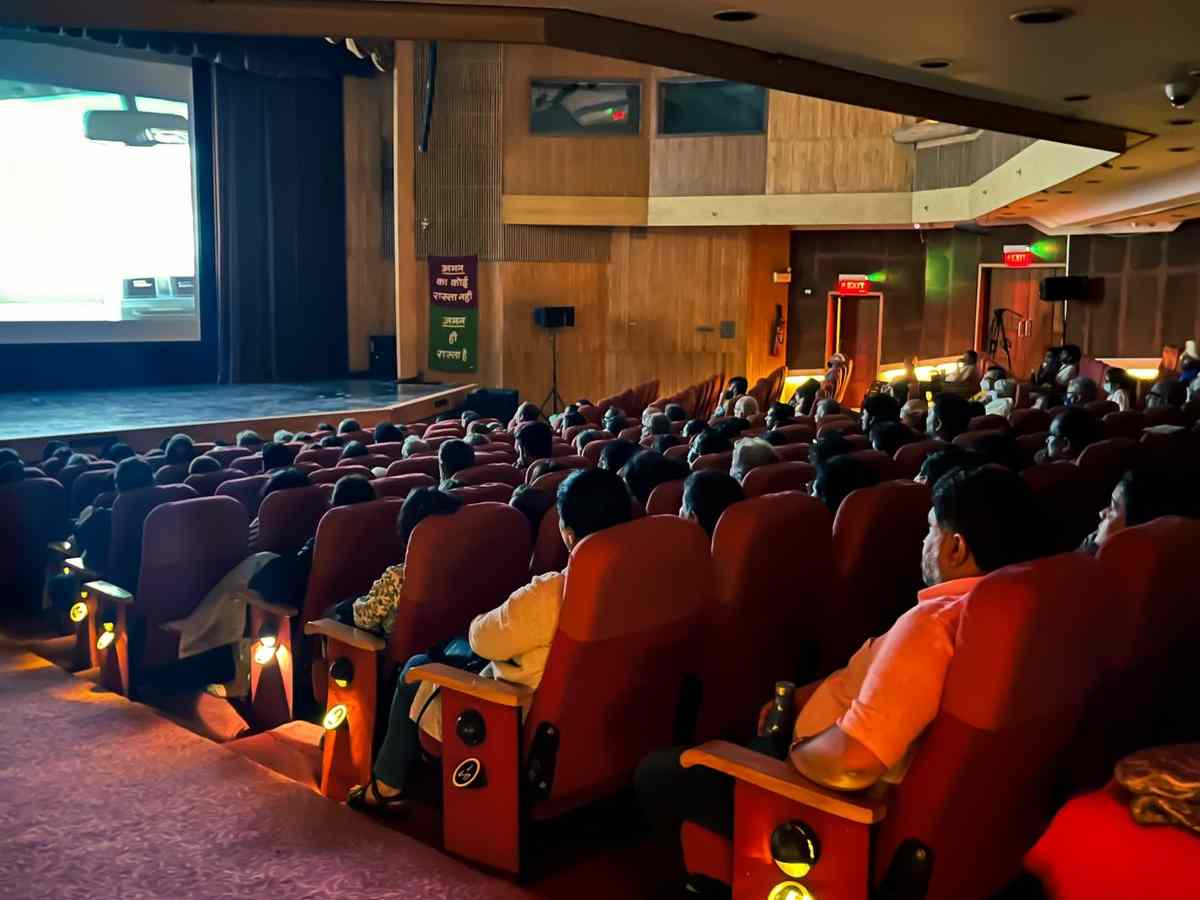
Delhi: The Kriti Film Club recently completed 25 years. With over 1,000 documentary and mainstream film screenings across genres and themes in more than 45 venues, and over 20 mini-film festivals at public venues, local communities, schools, colleges and institutions across 21 states, the volunteer-run, independent neighbourhood film club has showcased works by more than 750 amateur and professional filmmakers till date.
Over the past two-and-a-half decades, the club has accumulated the largest database of documentary films in the country and has achieved many significant milestones.
Various academic as well as civil society institutions have requested Kriti Film Club for curations in the past. The club has also partnered with several national film festivals, such as the IAWRT Asian Women’s Film Festival, Auroville International Film Festival, Dharamshala International Film Festival and the Habitat International Film Festival, to nominate films and be a part of their festival jury.
Also read: Indian people enjoyed my vision of France: 90-year-old artist
“The belief and power of documentary cinema has kept us going along with the faith of filmmakers in taking their films to diverse audiences, the feedback of audiences, support of venues and our amazing volunteers,” gushed Aanchal Kapur, Kriti’s Founder Leader.
Founded in Delhi in 1999 as a space to screen and discuss documentary films that provide rich and diverse perspectives, stories and solutions on issues that matter for ordinary citizens, people’s movements, civil society, academic institutions and policy makers, the club curates, screens and discusses independent cinema every month both offline and online.
“With the motto of #thoughtprovokingcinema for #socialimpact, the club’s mission is to use films as a tool for social impact by positively influencing mindsets and behaviour towards creating a gender-equal, inclusive, sustainable and peaceful world,” informed Kapur.
Further, its ‘Doculive’ platform is a first of its kind space for viewing independent cinema. Through its journey so far, Kriti has transformed the documentary viewing culture in India. The club routinely curates and organises issue-based film festivals on demand, for several local and national organisations — with the agenda for social and environmental impact.
By enhancing access to such content beyond film festivals and one-off film events, it has taken these films to audience groups that otherwise do not get to view – least of all have conversations about – such content.
In 2020, Kriti initiated the first online festival, ‘Beyond Borders Feminist Film Festival’, with token support from Kamla Bhasin. It continued online the following year, and became hybrid in 2022 and 2023 with partial support from Jagori.
Kriti also organised the One Billion Rising film festival in 14 states, wherein it offered a curated package of feminist films which were then hosted by partner organisations.
In June this year, an ecoReels package of films on environment, climate change and sustainable development premiered in Delhi to mark Environment Day. Further, ‘Bachchon Ka Bioscope: A Young People’s Film Festival’ was held in November 2023, which had an audience of 600 children and youth from all over the Capital.
Packages of gender, sexuality and feminist films are also available as well as on labour, health, education, human rights, livelihoods, democracy and governance, art, culture and heritage.
Kriti’s niche has been to facilitate in-depth and safe conversations among filmmakers and audience, often leading to inspired thought and action around the issues presented in the films.
Also read: Hema Malini once called my acting bogus but said I looked like Dharmendra: Naseer Abdullah
“A young student decided to do Masters in Environment Management after seeing a film on ecology and displacement; a group of viewers got together and created a citizen campaign to segregate waste, collect and ban plastic in their neighbourhood after viewing a documentary on cows eating plastic waste on the streets; and audience members shared their mental health and ‘coming out’ sexuality experiences after watching films on these themes,” explained Kapur.
As a non-profit, Kriti also works with several women’s and youth groups across the country. One of its efforts is to support their dignified livelihoods through outreach of their handmade products through Gestures Ecological.
“This is our effort to promote sustainable production and consumption in these times when climate change is drastically affecting the natural and human world, while enabling local communities to live and earn with self-respect and their amazing skills transform into products of utility and décor,” said Kapur.
Today, the Kriti Film Club stands at a position of valuable knowledge, experience, network and credibility. Its growth is organic and in response to demands from different cities.
Currently, the club is trying to respond to increased requests from metropolitan, two-tier and three-tier cities and villages.
“We are looking for collaborations that can enable the Kriti Film Club to create spaces and opportunities, so that we can reach independent cinema to millions of ‘unconverted’ and ‘undiscovered’ audiences. We believe that this will be our footprint into #cinemaforsocialimpact and building a culture of active citizenship through films,” concluded Kapur.
(The writer is Neha Kirpal)
Delhi hosted what organisers describe as the world’s first player auction in golf, launching ‘72…
An elderly woman recalls how her six-year-old granddaughter lay bleeding after a speeding car hit…
Municipal Corporation of Delhi plans a unified policy enabling RWAs to adopt and maintain parks…
A 17-year-old boy allegedly died by suicide after jumping before a moving train at Uttam…
Delhi High Court grants bail to 26-year-old Thar driver accused of mowing down two in…
Two Rohini men arrested for fatally stabbing one person and injuring another during a robbery…